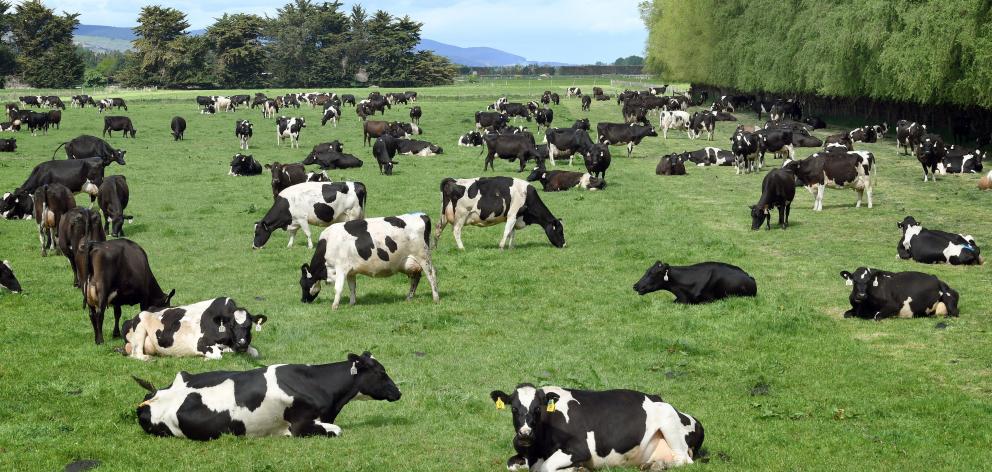
The target would be set at a range of 14 to 24% below 2017 levels by 2050, reflecting the findings of the independent Methane Science Review released in 2024, it said today.
Agriculture and Trade and Investment Minister Todd McClay said the government had worked closely with industry and accepted a range of advice to determine a "practical target".
"Today we're delivering a practical, fair pathway that recognises New Zealand agriculture efficiency, protects jobs and production, and upholds our climate commitments."

"Agriculture will continue make an important and fair contribution to achieving this reduction."
The announcement comes after the government in April ended a plan to put a price on agricultural emissions including methane produced by belching sheep and cattle, relenting to farmer pressure that the plan would make their business unprofitable.
The previous Labour government had introduced a plan to charge farmers for their gas emissions from the end of 2025, in what was hailed as a world first.
New Zealand, home to five million people, has about 10 million cattle and 26 million sheep. Nearly half its total greenhouse gas emissions come from agriculture, mainly methane.
ACT heralded the reduced methane target as a "win" for the party.
"Today the fantasyland assault on farmers has been slashed," party leader David Seymour said, claiming the announcement reflected science, not ideology.
But the Greens decried the government's halving of targets under the guise of "no additional warming" as a "cheap accounting trick".
"Today Christopher Luxon has downgraded climate ambition, meaning a higher cost of living and ultimately far worse outcomes for the farmers he says he's doing this for," co-leader and climate change spokesperson Chlöe Swarbrick said.
"Methane is a superheating gas - 80 times stronger at frying our atmosphere than carbon in the short-term. To keep a liveable planet, we must cut methane emissions.
"This methane denial betrays farmers who are on the front line of climate-driven extreme weather events that threaten global food production and rural livelihoods.
"Many farmers are innovating farming with lower emissions - not by denying the climate problem but by facing it."
In the statement, the government confirmed further policy changes alongside the new target:
• A legislated review in 2040 of the biogenic methane target to ensure its alignment with science and against progress of key trading partners.
• No tax on agricultural methane emissions, as this would risk closing down farms and send jobs and production overseas. Reductions in methane to meet the targets will be achieved in partnership and through industry leadership and processor incentives following the lead of companies including Fonterra and Silver Fern Farms.
• Investigate a split gas target for all of New Zealand's future international climate change commitments.
• Recognise and protect the importance of food production in New Zealand by better aligning domestic legislation with language in the Paris Agreement.
To back the new target, the government was already investing more than $400 million with industry to speed up the development and roll-out of methane-cutting tools, the release said.
The first was expected to be on farms in 2026, with up to 11 available by 2030.
This included innovations like EcoPond, which cuts effluent pond emissions by over 90%, alongside advances in genetics, feed and farm management.
"Technology has the potential to deliver emissions reductions, while enabling the sector to grow. It's expected that if 30 percent of farmers take up the technologies expected to be available before 2030, total agricultural emissions could reduce by between 7 to 14 per cent over the next decade. That's on top of any reduction in emissions that may come from efficiency gains on-farm or changes to farm systems," Watts said.
"Our approach is clear: technology and partnership, not taxes, will deliver the reductions that we need. By investing in new tools and giving farmers practical support, we can cut emissions without cutting production or profitability."
Federated Farmers happy
Federated Farmers welcomed changes to New Zealand’s climate policy as a long overdue and practical step that it believed would be well received by farmers.
"Kiwi farmers have been bogged down in completely unscientific, unaffordable and unrealistic climate policy for far too long," president Wayne Langford said in a statement.
"At times it’s felt like absolute madness that we’d even be talking about policies that would shut down farms, send production offshore, and completely undermine New Zealand’s economy."
Langford praised the decision to rule out a tax on methane.
"Today the government has also categorically ruled out unfairly putting a price on agricultural emissions like methane," he said.
"This is a major step forward and will be a huge relief for farming families who have had the threat of a massive tax hanging over our heads threatening the viability of our businesses."
The organisation also welcomed news that New Zealand’s climate laws would be rewritten to align with the wording of the Paris Agreement and ensure food production was protected.
'Going full Trump', says Greenpeace
Greenpeace believes the government's move to reduce methane targets and exclude agriculture from the Emissions Trading Scheme "amounts to full-blown climate denial".
"This is truly astounding," Greenpeace Aotearoa climate campaigner Amanda Larsson said in a statement today.
Prime Minister Christopher Luxon had "gone full-on Trump, she said. "He’s choosing climate denial and corporate profits over our kids’ future."
The environmental organisation believed the decision would weaken targets for biogenic methane - mostly from livestock - despite strong warnings from climate scientists that doing so could derail the global fight against climate change.
"New Zealand is the world’s biggest dairy exporter. If we back down on cutting emissions from our most polluting industry, you can bet other big livestock-producing countries will jump on the bandwagon. That could be game over for the climate," Larsson said.
"As if it wasn’t bad enough that people can’t afford butter while Fonterra banks huge profits - now Luxon’s handing big dairy a free pass to keep polluting, at the expense of a liveable future for our kids.
"This is about profits for a few, at the expense of climate catastrophe for millions," she said.
- additional reporting Allied Media and Reuters














